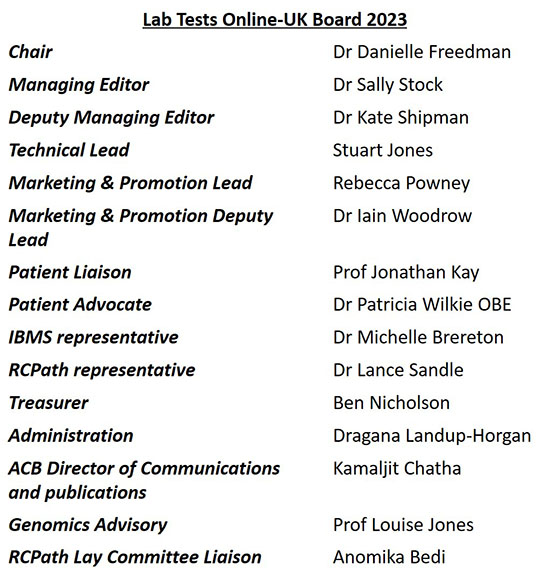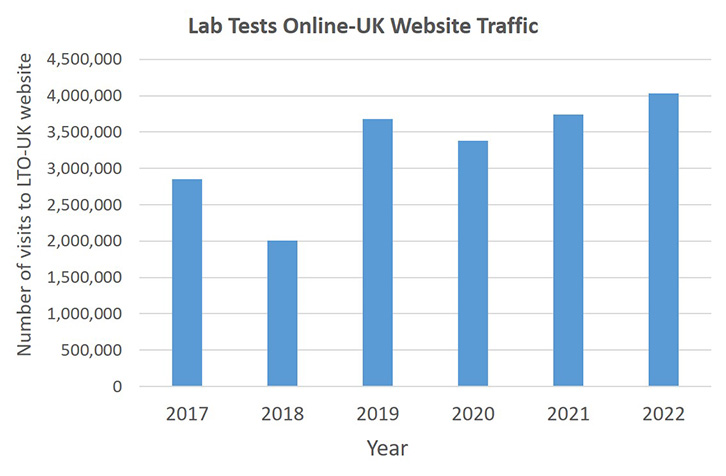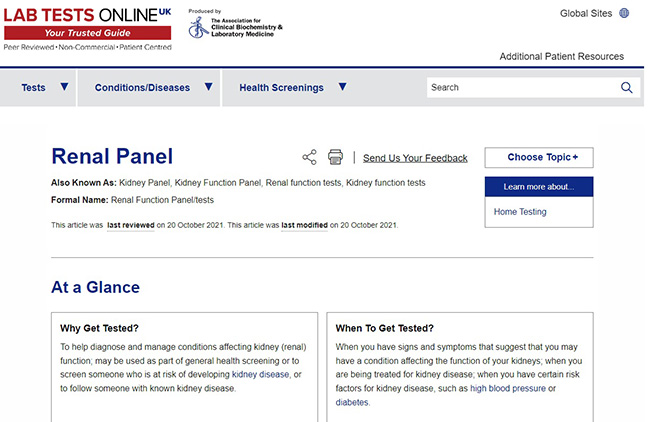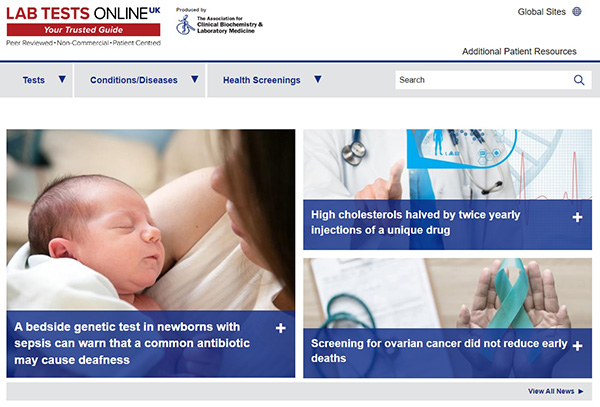In this article, Danielle Freedman and Rebecca Powney cover the successes of the Lab Tests Online-UK site.
The past
Lab Tests Online-UK (LTO-UK) is a website developed by NHS laboratory professionals that provides detailed, peer-reviewed information to help patients understand their laboratory tests. The website is patient-centred and provides descriptions of laboratory tests, the underlying conditions and updates on advances in laboratory medicine using language that is easily understandable for the patient.
Patient and lay representatives sit on the Board and comprise part of the editorial team. They ensure that content is suitable for lay readers and that the decisions taken regarding the website are beneficial for patients. The website is noncommercial and free to access, with support generously provided by the Association for Clinical Biochemistry and Laboratory Medicine (ACB), the Institute of Biomedical Science (IBMS) and the Royal College of Pathologists.

The Lab Tests Online concept originated in the USA and was developed into a website by the American Association for Clinical Chemistry (AACC), launched in 2001. The UK laboratory profession recognised the potential benefits of this site at an early stage and the ACB was successful in obtaining sufficient funding from the Health Foundation and the Department of Health (England) to develop a UK site. LTO-UK was launched by the then Minister of Health, Rosie Winterton, in June 2004.
The present
Although the site has developed and grown over the past 19 years, the foundations of being patientcentred, peer-reviewed and non-commercial remain the same. Its aim is to empower patients by providing free access to patient-focused information about laboratory tests. The licence for the site was originally held by the AACC and, following commercialisation of the US site in 2020, the licence was transferred to the ACB in 2021, with a wealth of opportunities for the future development of the website.
The site now includes 306 tests and 119 conditions; the tests span the breadth of laboratory medicine disciplines, from andrology to virology. The popularity of the site continues to increase year on year, with 4,034,882 visits to the site last year – an increase of 8% compared with the previous year. One of the fundamental pillars of LTO-UK is that the site is free from commercial bias and its users are free from advertisements and sales. It is funded by the ACB, IBMS and the College, with administrative support and hosting by the ACB.
Under the auspices of the ACB, the LTO-UK Board governs and manages the website. The Board comprises volunteers from across the laboratory disciplines and includes representatives from each of the 3 professional bodies that fund the site. Editorial work is all performed on a voluntary basis by a team of laboratory doctors and scientists, with a managing editor and deputy overseeing and finalising the editorial work. The information on the site is continually reviewed and updated, with additional pages added as required and news articles published on a regular basis.
The evolving laboratory–patient interface
The NHS England Patient Online programme was launched in 2015, following the announcement by the then Secretary of State for Health and Social Care, Jeremy Hunt, in 2011, that all patients in England would be given access to their full digital GP record (including test results) by April 2015.

More recently, this commitment has been added to the General Medical Services contract, which now mandates GP practices to enable full online record access for all patients. This has led to a more significant increase in uptake by patients.
The majority of GP systems now allow patients full online access to their records. According to NHS England data, as of February 2023, 49% of all patients in England have been registered for one of these online services (summary record, appointments, repeat prescriptions, detailed coded records). 21% have full online record access (including test results) – a significant increase from the 13% who had full online record access in March 2022.
In relation to laboratory medicine, this means that patients with detailed coded record access can view their laboratory test results as soon as they are filed on the GP system. Access can be direct via the GP system or via a plethora of third-party apps, including the NHS App, which can access the same GP system data feeds.
As eloquently discussed in the October 2020 Bulletin article by S Jones and P Wilkie, there are considerable complexities around this, from the presentation and format of the data displayed to the supporting information provided. The article makes clear that there is an increasing demand and expectation from patients to be able to view and access their laboratory test results. There are significant benefits for patients and the healthcare system to be empowered in this way, with manageable risks.
Pre-dating the Patient Online programme, there have been multiple disease-specific initiatives that have provided patients with direct access to their test results, alongside tools to aid management of specific chronic diseases, such as diabetes and inflammatory bowel disease (IBD).
Evidence to support improved patient outcomes is lacking in relation to general medical record access; however, access to disease-specific test results for patients with chronic conditions, such as IBD and diabetes, are increasingly demonstrating the benefits of this approach for patients and for the healthcare system.1,2
A valuable tool for patients
LTO-UK is in a unique position to support and empower patients, compared with other patient information resources about laboratory tests, owing to the information on the site being written and reviewed by NHS laboratory professionals with no commercial bias. In addition to highquality content, the mechanisms of access to the site, which include embedded links in some of the main GP systems, provide a unique opportunity to engage patients.

The information on the website is valuable, with multiple routes of access to support patients in understanding their laboratory tests:
- embedded links alongside test results – links to LTO-UK alongside patient test results provides self-directed access to this reliable resource for patients to find out more at the point of reviewing their test results on their patient record. This immediate and simple approach enables patients to access reliable information that improves their understanding of their test results in real time. We have good evidence that patients are already accessing the website in this way, with 16% of all website traffic originating from links in GP systems (data from January to March 2023).
- direct access – patients can access the site directly at the point of an enquiry coming to mind; they would either need to know about the site already, see marketing for it or have it recommended by someone
- search engine-directed – a page from LTO-UK is listed in the results from a search enginebased search, prompted by any number of scenarios as suggested above
- healthcare professional-directed – a healthcare professional directs the patient to LTO-UK during any point of contact. Again, multiple scenarios may lead to this point, including a patient information leaflet regarding a blood test a patient is due to have, during a consultation, or during the phlebotomy episode itself.
- embedded links from other websites – websites such as nhs.uk, Patients Know Best and individual hospital trust websites have links to LTO-UK embedded in their content. When a patient uses one of these websites, they click on the link and it takes them directly to the LTO-UK website. This accounts for 17% of all website traffic (data from January to March 2023).
As touched upon in Jones and Wilkes’ article, the information on the site is designed to improve patients' understanding of laboratory tests and, therefore, has advantages but also some disadvantages.
Potential advantages
- Improved understanding of laboratory tests can increase the role of the patient in making decisions about their own health.
- Increased patient knowledge and independence have the potential to foster a richer dialogue between healthcare professionals and patients.
- Increased patient knowledge and understanding can help identify missed abnormal results.
Potential disadvantages
- Misinterpretation of test results may cause false reassurance or increased anxiety.
- Lack of further engagement, when this would be beneficial, with healthcare professionals, due to self-directed knowledge and interpretation.
- Seeking further information from unreliable and non-reputable resources owing to desire for more detailed information than is provided on the site.

The future
The transfer of the licence for the LTO-UK site to the ACB has opened up a wealth of opportunities for development that were not previously possible with the previous restrictions. The Board is actively working on plans for the development of the site in the short, medium and long term. The immediate challenges faced are around editorial availability and security of funding with a sustainable model for both required. The Board is resolute that the defining foundations of the site will remain unchanged, with a patient-centred approach, using peer-reviewed information and maintaining non-commerciality.
How can you get involved?
Editorial work
The Editorial team welcomes interest from laboratory doctors and scientists from all disciplines of laboratory medicine to update the content of the website and to write news articles. Editing and developing website content is an excellent opportunity for CPD activity and to improve your lay writing skills – something all laboratory professionals can benefit from.
Marketing and promotion
The Marketing and Promotion team welcomes interest from laboratory doctors and scientists who would like to be involved in promoting the website. Opportunities include exhibitor attendance at the annual conferences for the Royal College of General Practitioners and the British Society for Haematology. Free marketing materials are available for healthcare professionals to support signposting to the benefits of LTO-UK for their patients.
Please email [email protected] forfurther information.





